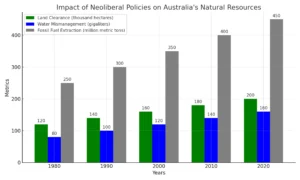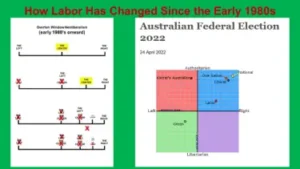Description: Neoliberal Agenda
Explore how Australia’s two-party system and neoliberal economic focus impact young Australians. Discover ways to make politics more inclusive and responsive to the needs of all citizens.
Introduction
In Australia’s politics, the two-party system often agrees on many things, especially economic policies focusing on business and less government control, which are all part of the neoliberal agenda. While this might sound good for the economy, it needs to catch up on essential things like fairness, caring for our planet, and ensuring everyone receives help from growth. This article will investigate how this way of thinking affects us all and suggest ways to make politics more about people, especially young Australians.
The Issue of Bipartisanship: Not Enough Choices
Limited Political Options
One big problem is that Australia’s main political parties are remarkably similar because they follow the same neoliberal economic ideas. They are bipartisan on many issues. This means we have limited options to choose from when we vote. It’s like having to pick between two similar flavours of ice cream. This lack of variety can make it hard to address significant issues like climate change and inequality and make sure everyone can afford to live well. Young Australians are looking for real change that seems just out of reach.
Impact on Democracy
The lack of diverse options can also lead to disillusionment with the political system, especially among young people. When both major parties offer similar policies, it can be challenging for voters to feel like their voice matters or that their vote will make a difference. This can lead to voter apathy and a disengagement from the democratic process.
The Wider Impact
Economic Focus vs. People’s Needs
The focus on business and economic growth has other effects, too. It can make it harder for people to get the help they need, like affordable housing, secure jobs, and good healthcare. This can cause people, especially young people, to feel left out and less interested in politics. It can also make it harder for everyone to feel like they are being treated fairly and have a say in their future.
Environmental Concerns

Additionally, the neoliberal agenda often prioritizes economic growth over environmental sustainability. This can lead to policies that harm the environment, such as increased mining or deforestation, which can have long-term negative effects on the planet and future generations.
Solutions: A New Direction
Supporting Alternative Ideas
To improve politics for everyone, we need to start supporting ideas and people who think about more than just the economy. This means considering smaller parties or independent candidates who have different ideas as an alternative to the neoliberal agenda. We also need to help everyone understand more about politics and how they can get involved. This can shift politics towards serving the community and environment. By doing this, we can move away from old ideas and improve politics for everyone.
Education and Engagement
Educating young Australians about the importance of political engagement and providing them with opportunities to take part in the political process can also help. By empowering young people to have a voice in politics, we can ensure that their concerns are heard and addressed by policymakers.
The Challenge with the NACC
Ensuring Transparency
Australia’s new National Anti-Corruption Commission (NACC) is a big step towards making politics cleaner and more honest. But there are concerns about parts of its work being kept secret. For the NACC to make a difference, it must be very open about what it does. This means ensuring everyone understands the importance of honest and trustworthy leaders. The NACC can help build trust in politics by showing it’s working for everyone’s benefit.
Conclusion
Looking at Australia’s politics, it’s clear we need to make some substantial changes. With its focus on the economy and not enough on people’s needs, the current system only works for some. The effects are wide-ranging, from making it hard for people to get involved in democracy to making life more challenging for many Australians. We all must work together to support different ideas and people in politics to improve things. This means getting involved, learning more, and helping make sure politics is about everyone’s future.
Question for Readers
What can you do to help make Australia’s political future brighter and more inclusive? How will you ensure we hear from a wider range of voices?
Call to Action
Now’s the time to get involved! Learn more about politics, support different candidates, and make your voice heard. What you do now can help create a better Australia where politics is about all of us. Spread the word, join the conversation, and be the change you want to see. Together, we can change Australian politics for the better.
References:
I’m Here for An Argument:
https://www.google.com.au/url?sa=t&source=web&rct=j&opi=89978449&url=https://australiainstitute.org.au/wp-content/uploads/2020/12/P341-Im-here-for-an-argument-w-cover.pdf&ved=2ahUKEwinna-0mI6FAxWVs1YBHcCvCJ8QFnoECC0QAQ&usg=AOvVaw2h8IRQYWDG3eEttmNiBmn2
Is bipartisanship on national security a good thing: https://www.lowyinstitute.org/the-interpreter/bipartisanship-national-security-good-thing


Bipartisanship is fundamentally UNdemocratic. It takes away public debate on important issues. We need a grass roots campaign to attack the Two Party Duopoly and bipartisanship as anti-democratic.
I agree. Bipartisanship does not give voters much of a choice.
I like the graphics but they need a bit more information to explain what they really mean. For one thing, the first one says “the left”, does it mean Labor? Has “the right” moved? Are they just visual assertions or based on something? What?
The :Left” mean how Labor used to be and how they have moved closer to the other right-wing parties.